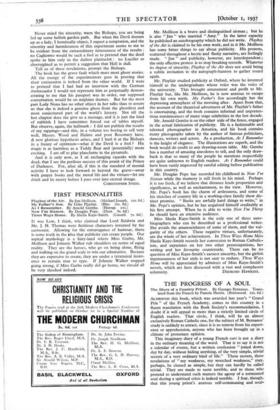FIRST PERSONALITIES
Playboy of the Air. By Jim Mollison. (Michael Joseph. ros. 6d.) My Father's Son. By Giles Playfair. (Bles. los. 6d.) As I Remember. By Arnold Genthe. (Harrap. 21s.) Now I'm Sixteen. By Douglas Pope. (Dent. 8s. 6d.) Three Ways Home. By Sheila Kaye-Smith. (Cassell. 7s. 6d.)
IT was Low, I think, who claimed that Lord Baldwin and Mr. J. H. Thomas were fictitious characters invented by the cartoonist. Allowing for the extravagance of humour, there is some truth in the idea that publicity can create people. Our
topical mythology is a fairy-land where Miss Garbo, Mr. Mollison and Johnnie Walker rub shoulders on terms of equal reality. They are the heroes, who go on being alone, flying and walking on the grand scale to win our admiration. Because they are expensive to create, they are under a tyrannical insist- ence to remain true to type. If Johnnie Walker stopped going strong, if Miss Garbo really did go home, we should all be very shocked indeed. Mr. Mollison is a brave and distinguished airman ; but he is also " Jim " who married " Amy." In the latter capacity he published an autobiography which he did not write. Playboy of the Air is claimed to be his own work, and in it Mr. Mollison has some bitter things to say about publicity. His protests, scattered throughout a hectic and flashy narrative, are feelingly made. " Jim " and publicity, however, are interdependent ; the only effective protest is to stop breaking records. Whatever its degree of sincerity, Playboy of the Air does not avoid being a subtle invitation to the autograph-hunters to gather round again.
Mr. Playfair studied publicity at Oxford, where he invented himself as the undergraduate whose voice was the voice of the university. This brought amusement and profit to Mr. Playfair but, like Mr. Mollison, he is now anxious to escape from his own myth. My Father's Son accordingly has the depressing atmosphere of the morning after. Apart from that, the account of the theatrical adventures of Mr. Playfair's father is entertaining, and the book contains informal and unpreten- tious reminiscences of many stage celebrities in the last decade.
Mr. Arnold Genthe is on the other side of the fence, engaged in the actual fabrication of publicity. He is a fashionable and talented photographer in America, and his book contains many photographs taken by the author of famous politicians, dancers, writers and actors. As a production, As I Remember is the height of elegance. The illustrations are superb, and the book would do credit to any drawing-room table. Mr. Genthe has a number of amusing anecdotes to tell, and the only draw- back is that so many of the people he mentions respectfully are quite unknown to English readers. As I Remember could have been vastly improved by careful editing before publication in this country.
Mr. Douglas Pope has recorded his childhood in Now I'm Sixteen while the memory is still fresh in his mind. Perhaps it is too fresh, if we believe that distance lends proportion and significance, as well as enchantment, to the view. However, Mr. Pope's book has the charm of artlessness, and some of his sketches of country life in a working-class family show dis- tinct promise. " Books are awfully hard things to write," in Mr. Pope's opinion, but he has acquitted himself creditably at his first attempt. When he is able to write Now I'm Thirty he should have an attentive audience.
Miss Sheila Kaye-Smith is the only one of these auto- biographers who can be described as a professional writer. She avoids the amateurishness of some of them, and the vul- garity of the others. These negative virtues, unfortunately, are the whole of her achievement. In Three Ways Home Miss Sheila Kaye-Smith records her conversion to Roman. Catholic- ism, and expatiates on her two other preoccupations, her writing and her favourite countryside. There can- be no question of Miss Kaye-Smith's earnest sincerity, but the girlish ingenuousness of her style is not easy to endure. Three Ways Home will be appreciated by admirers of Miss Kaye-Smith's novels, which are here discussed with a vast and complacent






































 Previous page
Previous page